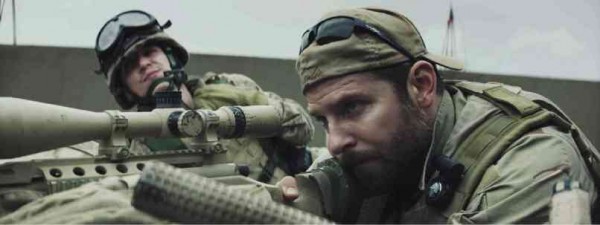Violence takes its inexorable toll
Clint Eastwood’s “American Sniper” dramatizes the unusual military career of Chris Kyle, who singlehandedly shot down over 160 foes in an extended series of tours of duty in the Middle East.
Hailed as a true-blue hero by his grateful countrymen, he turned out to have lived a conflicted life, because his extreme focus on fighting the enemy had forced him to clamp down on his feelings, so he could concentrate fully—and coldbloodedly—on the military objective at hand.
His wife and children ended up as “collateral damage” in the process—until he realized that he had neglected them beyond endurance, and finally turned his back on his heroic exploits, so he could belatedly live and love again.
The best decision the film’s producers made was to tap Eastwood to direct it. Famous in his own right as a tough cowboy and action star, Eastwood is also a sensitive and insightful screen artist, so he’s effectively plugged into both sides of the hero-vs-humane “argument.”
Starting with his unusual protagonist’s childhood, the director shows how he was molded into the standout combat sharpshooter he later became. He did take time out to fall in love and get married, but his fervently felt duty to defend his country was clearly more important to him than his marital vows, and his familial obligations.
Article continues after this advertisementAs a result, even as his military exploits were cheered and hailed as “legendary,” his wife and children were miserable, because they constantly feared for his survival, and missed his loving physical presence.
Article continues after this advertisementIn time, even Kyle realized that he was in a bad way. He had trained himself so well to become a “killing machine” that he no longer felt connected to the people he loved most—and his wife threatened to leave him.
The last straw was when he almost shot down a boy who had grabbed a weapon but later decided not to use it against approaching American soldiers.
It was as if the sniper had been pushed to make a moral choice that only God should make—and the fact that he almost made the wrong, split-second decision was a realization that was too much to bear.
Eastwood’s main helpmeet in limning his film’s instructively conflicted portrait of its hero is his lead actor, Bradley Cooper, who gained an additional 40 lbs to look more like Kyle.
The radical transformation is dramatically convincing, and enables the popular actor to “disappear” into his assigned character, the better to depict and vivify him.
Sienna Miller, who plays his unhappy wife, is similarly committed to her role, and the production’s ensemble of actors who portray other members of the military also turn in spot-on cameos.
In the film’s “epilogue,” after Kyle retires from combat duty, its thematic focus on violence acquired even greater dramatic irony:
The now-retired sniper works with veterans wounded in combat to hone their sharpshooting skills so they can regain their sense of self—and yet, he’s killed by a psychologically troubled veteran he’s been trying to help!
Thus does “American Sniper” show that violence can take many forms—but, it still ends up taking its inexorable toll.
